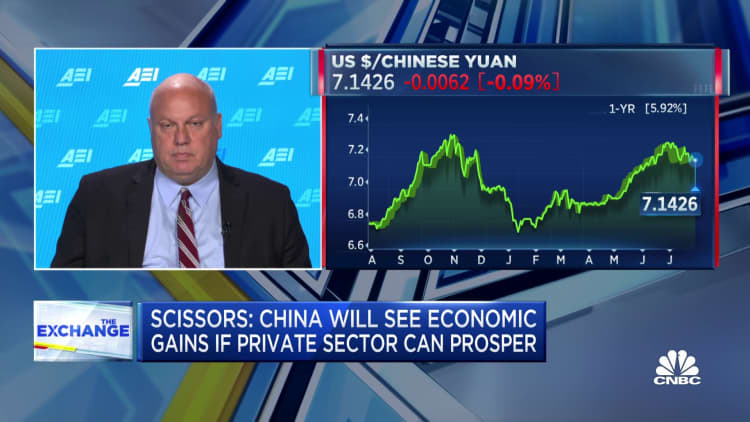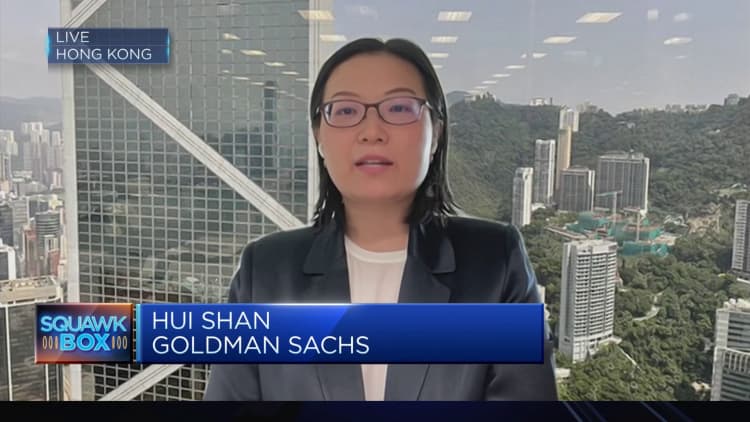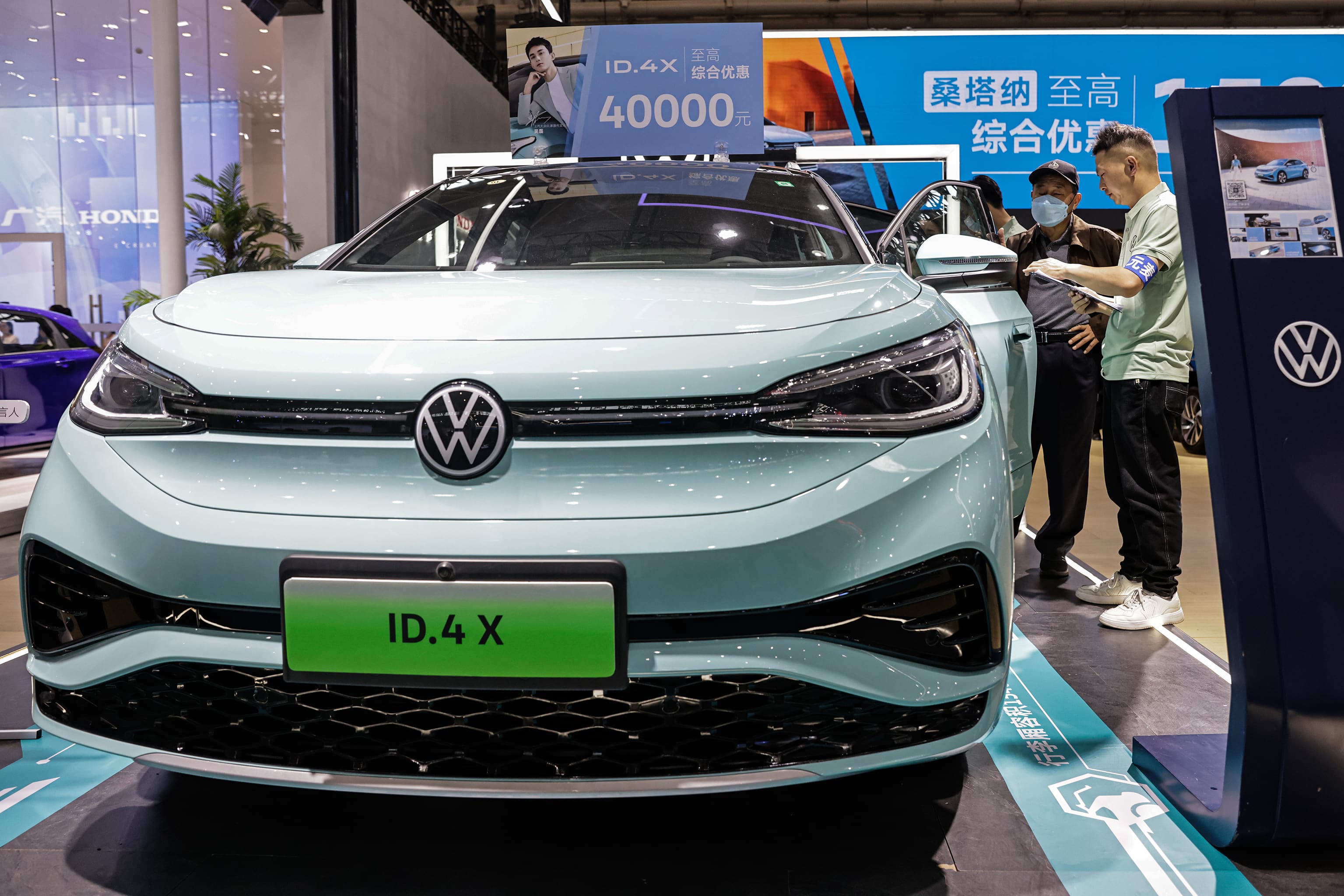
[ad_1]
Tourists at a water park on July 23, 2023 in Nanjing, China.
Yang Bo | China News Service | Getty Images
BEIJING — Instead of handing out cash, China is trying to make sure consumers and businesses spend where it matters economically.
On Monday, the central government announced 20 measures to support tourism, as well as spur consumption of electric cars and so-called smart appliances. That refers to household devices that typically can be customized with a smartphone app, and are often more environmentally friendly.
The measures aren’t just for consumers, but also for suppliers to know what to focus on, Xu Hongcai, deputy director of the Economics Policy Commission at the China Association of Policy Science, said on Tuesday.
Overall, he said the measures are meant to stabilize spending on more expensive, big-ticket items, while addressing areas of weakness such as in rural areas.

High on the list was support for purchases of new energy vehicles, which include battery-powered and hybrid cars.
While China has already extended tax breaks for new energy vehicles, authorities on Monday also called for installing battery charging stations and other measures to lower costs for electric car drivers.
Among other big-ticket items, the new measures called for encouraging households to remodel and install a complete “smart home.” Such linked appliances are also known as the internet of things.
The rural market
The measures and official comments at a briefing late Monday emphasized the need to boost consumption in rural areas and at the mass market level.
The support measures announced included an entire section on spurring rural consumption. Specifics included subsidizing trade-ins for purchase of smart household appliances, improving delivery services and promoting rural tourism.
Policy for spurring consumption starts with helping consumers spend frugally, buy higher quality products and avoid illegal schemes, said Li Chunlin, deputy director of the National Development and Reform Commission, which oversees economic planning. That’s according to a CNBC translation of his Mandarin-language remarks at Monday’s briefing.
When asked about consumer incomes, he noted the recovery in tourism directly increases locals’ income.
Li also said authorities would work to enable more low-income groups to enter the middle class. He did not share details.

Just under one third of China’s 1.4 billion people were considered middle class in 2022, according to Boston Consulting Group. The firm defined the middle class as households with monthly disposable income of 9,500 yuan to 29,900 yuan, or between $1,325 to $4,172.
The majority of people in China had far less disposable income, the report showed.
Median disposable income for rural households rose by 6.1% in the first half of the year from a year ago, official data showed. But at 8,920 yuan ($1,245) in disposable income, rural households only had about 40% of what urban households had to spend.
Urban households saw median disposable income grow by 4.4% in the first half of the year from a year ago – slower than the 5.5% GDP increase, the data showed.
A lack of consumer confidence and uncertainty about future income has weighed on China’s retail sales, which was expected to drive the overall economic recovery after three years of Covid controls.
Domestic tourism and vacations
Since China ended those restrictions in December, local tourism has picked up quickly.
Domestic flights in July have recovered to slightly more than their 2019 levels, while the movie box office is also above pre-pandemic levels, Nomura analysis showed.
The firm expects retail sales to rise 5.5% year-on-year in July, up from 3.1% in June.
The new measures also encouraged employers to give more paid days off and for people to take off-peak vacations. Most workers in China only get a few vacation days a year, in contrast to two to four weeks offered by employers in countries such as the U.S.
Authorities said they would promote concerts, sports events and other cultural activities.
An inherent challenge China faces is trying to get consumers to drive economic growth, when policy has long favored an investment-led model.
Xu said more effort is needed to shift the economic balance toward consumers, such as giving consumer loans a greater share of bank loans versus business loans.
He expects retail sales will grow by less than 10% for all of 2023.
No vouchers
However, the latest support measures are another firm signal that Beijing will not pursue nationwide consumption vouchers, as the U.S. and Hong Kong did in the wake of the pandemic.
On one hand, the government doesn’t have much money, economists said.
On the other, despite a variety of views within the government, Chinese authorities just aren’t used to giving cash directly to consumers, said Wang Jun, chief economist at Huatai Asset Management.
“There’s no consensus,” he said in Mandarin, translated by CNBC. He said local governments, especially those with better finances, might try some form of consumption voucher.
Monday’s announcement followed a top-level Politburo meeting last week that laid out economic policy directions for supporting the property market and consumption. China’s leaders typically take a break in early August.
“At this point, what the [central] government is able to do, the things it is willing to do, have basically all been done,” Wang said.
While he described China’s economy as needing time to slowly heal, he expects double digit growth in retail sales growth from last year.
[ad_2]
Source link

